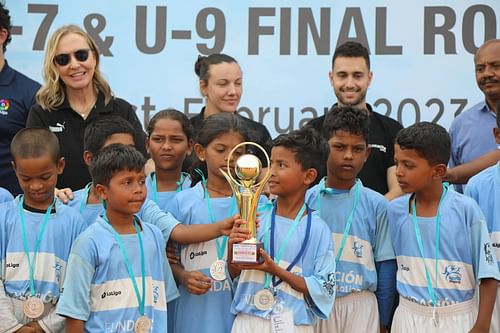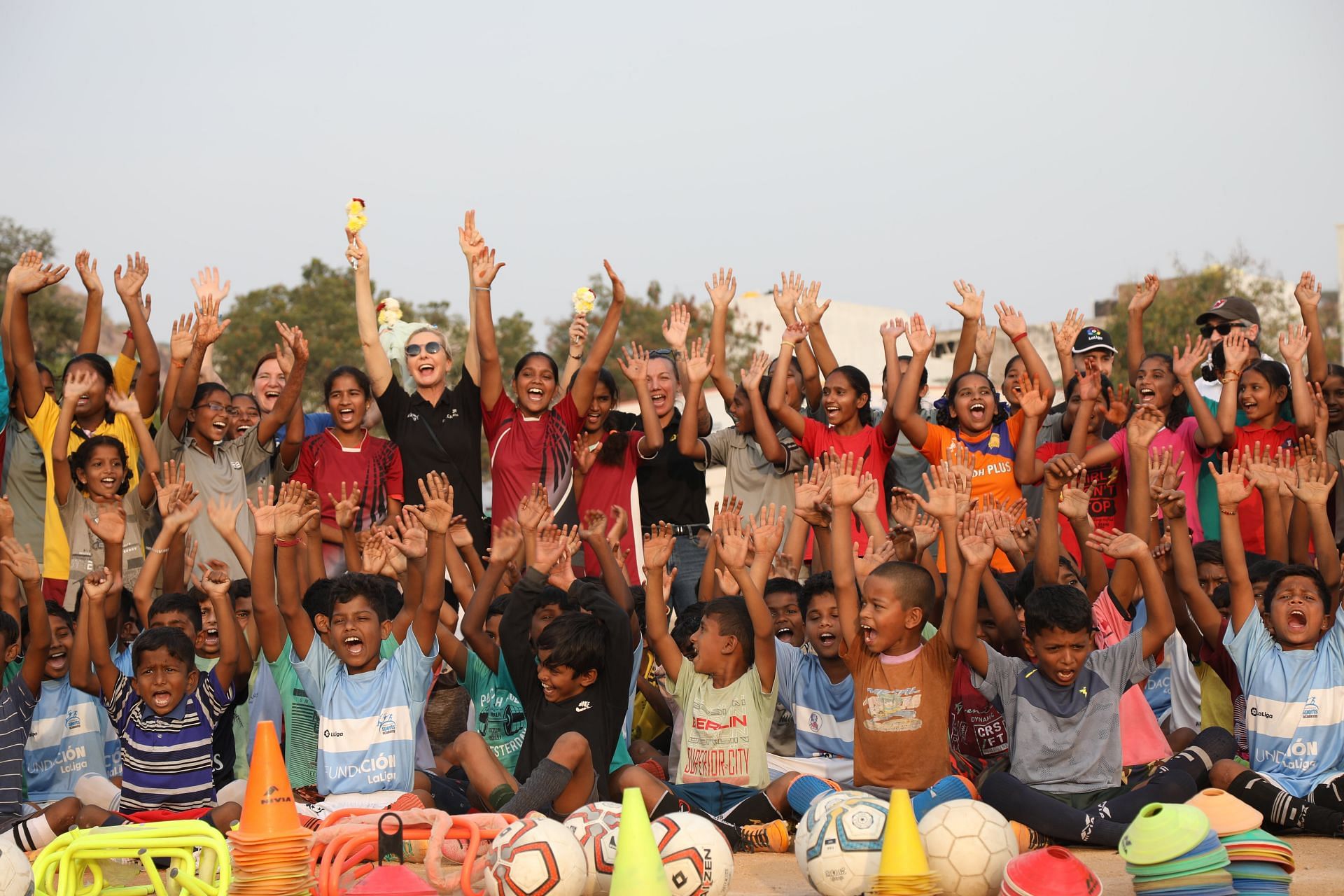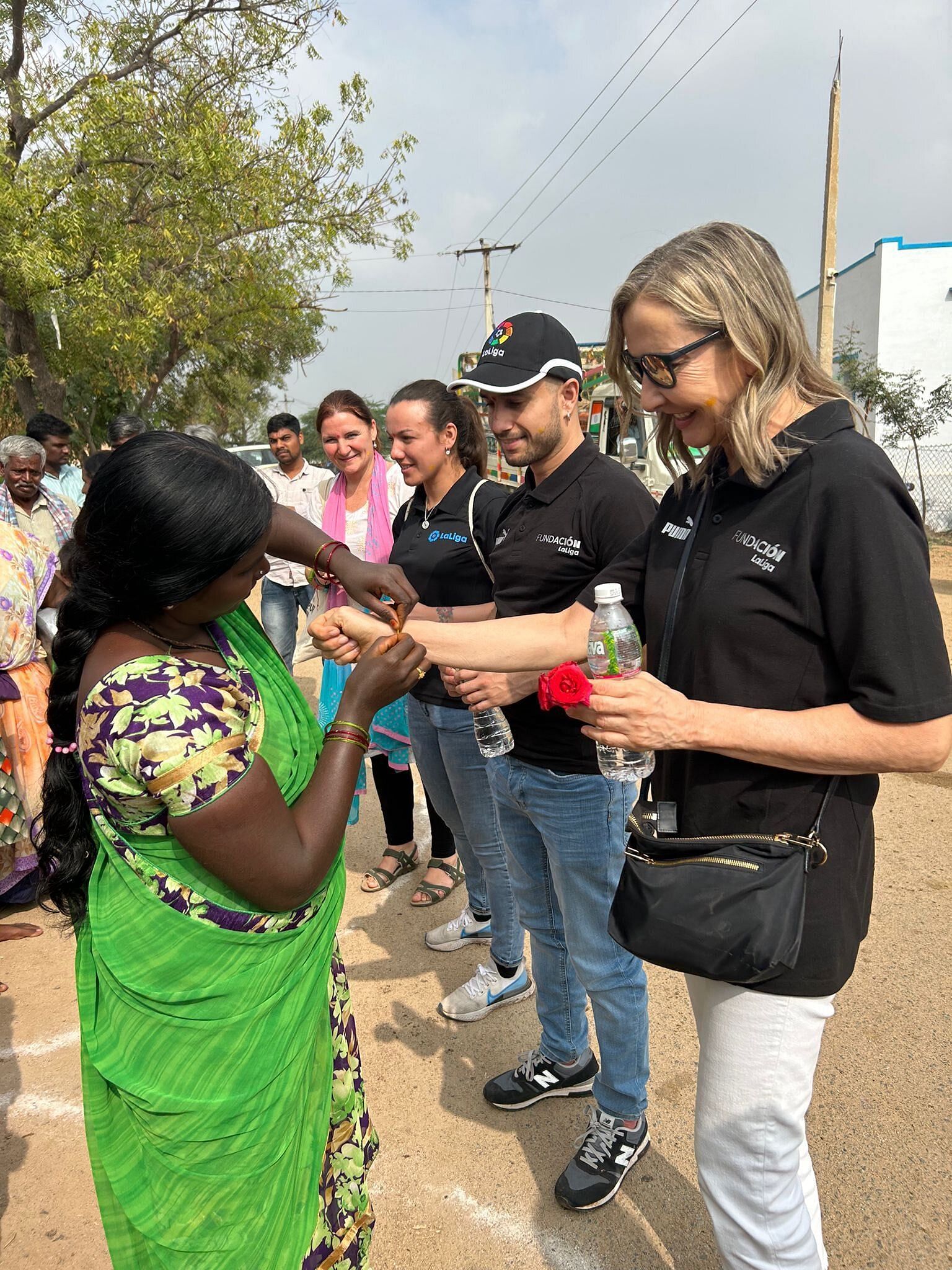
'We’re proud that we could see a lot of joy in the faces of the budding women footballers' - Jose Antonio Cachaza
Football is more than just a sport; it's a unifying force that has the power to bring people together and inspire positive change in the community.
La Liga, Spain's premier football league, has teamed up with the Vicente Ferrer Foundation, a non-profit organization, to harness the power of the beautiful game and empower young girls in developing countries. Their collaborative program, the La Liga and Vicente Ferrer Girls Academy and Football Program, is aimed at promoting gender equality and helping young girls achieve their dreams through football in India.

The La Liga and Vicente Ferrer's Girls Academy program was launched in 2018 and aims to provide young girls with access to quality education and football training.
The program takes place in the Anantapur district of Andhra Pradesh, India, and is designed to provide girls with a safe and inclusive environment to learn and play. The program is structured around three core pillars: football training, education, and personal development.
The beautiful game is capturing the hearts of fans across the country with its dynamic and thrilling matches. From local leagues to international competitions, the sport is gaining momentum and providing exciting opportunities for players, fans, and businesses. With a growing fanbase and increased investment, the sport is set to score big in India in the coming years.
In an exclusive interaction with Sportskeeda, La Liga India's Managing director Jose Antonio Cachaza, and La Liga's ambassador Anair Lomba, discussed the opportunities in the football ecosystem, the importance of gender equality, and the initiatives in which La Liga is collaborating with the Vicente Ferrer foundation.
Reflecting on the sport's rise and the program's vision and mission, La Liga India's Managing director Jose Antonio said:
"India is shaping itself as a footballing nation. Obviously, cricket stands top and is the most loved sport in India, but clearly football is growing in India at every level. That’s why many top European leagues are tying partnerships. La Liga has its presence in every country, and we strongly invest in social projects in bringing a change in the sporting ecosystem."
The partnership between La Liga and the Vicente Ferrer Foundation aims to promote social development and education through the sport, with a focus on creating a positive impact in rural communities in India.
Jose further discussed the vision of the partnership program, which is to use the power of football to drive positive change and create a better future for children and communities in India while also promoting La Liga as a responsible and socially conscious organization. The goal is to leverage the reach and popularity of football to bring about meaningful, long-lasting change. Jose added:
"We’re happy to collaborate with the Vicente Ferrer foundation in setting up the residential academy for girls. We’re structured around helping girls to learn quality football along with life skills. It’s a modest cooperation in developing football, and we’re proud that we could see a lot of joy in the faces of girls and that’d be our biggest achievement."
Commenting on how the partnership clicked, sharing their common vision that helped the La Liga and Vicente Ferrer foundation, Jose said:
"In the case of India, RDT’s [Rural Development Trust] deep connection with Spain made it easier for us to establish a relationship. We began our association with RDT six years ago, beginning with providing jerseys and kits. Now it has evolved into the running of the first women-only residential football academy in India."
Sports positively impact the economic progress and intellectual development of a country. They can create job opportunities in the sports industry and boost tourism through international events. A strong sports culture can also foster national pride and unity, boosting the India's national identity.
Additionally, investment in sports education and training can improve citizens' physical and mental health, promoting overall well-being and intellectual development. Sports bring people together, stimulate local economies, and can significantly drive economic progress and intellectual growth in India. Jose further added how sports can be a key driver of society's development by saying:
"It's important to add sports to education, as it brings development and values to individuals and society. It’s about team building, leadership, healthy competitiveness, and a lot of values associated with sports. It’s also important to start integrating sports from the foundational level. India is advancing in the right direction and we see economic progression happening."

Football is growing at every level in India. The 2022 Roadmap of the All India Football Federation (AIFF) highlights several key initiatives to promote and develop the sport in India. The roadmap includes plans to increase the number of professional clubs and enhance the infrastructure for the sport.
The AIFF also aims to provide more opportunities for young talent and increase the participation of women in the sport. The federation is also working towards improving the national team's performance and raising the standards of coaching and refereeing. The federation intends to promote the sport beyond the traditional footballing regions and make it more accessible to fans across the country. Jose also commented on AIFF's initiatives to revolutionize a change in the footballing ecosystem, saying:
"We’ve been seeing AIFF betting heavily on grassroots development. It's good to see they are [providing a] strong foundation for the sport by encouraging children to participate and providing them with the necessary resources and training. AIFF is already taking the right direction in promoting the sport through a lot of initiatives. We’ll try our best to cooperate with the federations to support that."
Indian women footballers have showcased their talent, and just need right focus, feels Anair Lomba
Women's football has seen a significant rise in popularity on a global level over the past few years. With more and more countries investing in their women's football teams, we are witnessing an increase in the number of professional leagues, tournaments, and opportunities for female players.

India's rise in women's football has been slow but steady. Despite facing several challenges, such as lack of infrastructure, funding, and societal stigma, Indian women footballers have continued to showcase their talent on the national and international stage.
Former Valencia and Espanyol Femenino player Anair Lomba commented on the rise of Indian women's football, saying:
"I am surprised by the talent and with the motivation that the players display here. We have observed the players here and we feel we can improve our coaching techniques and lessons to keep going in the desired direction. Indian women footballers have continued to showcase their talent and what they need is the right focus."
The Indian women's national football team has made significant progress recently, climbing the FIFA rankings and winning several tournaments. In 2019, they reached the second round of the Olympic qualifiers for the first time in history, and in 2021, they made it to the third round of the AFC Women's Asian Cup qualifiers.
There has also been an increase in the number of women's football leagues and tournaments in India, providing more opportunities for young girls to pursue the sport professionally. The introduction of the Indian Women's League in 2016 and the participation of Indian clubs in the AFC Women's Club Championship have been significant milestones in developing women's football in India.
Overall, the rise of women's football globally and in India is a positive development for the sport. It is crucial to continue investing in its development to create a more inclusive and equitable future for the sport.